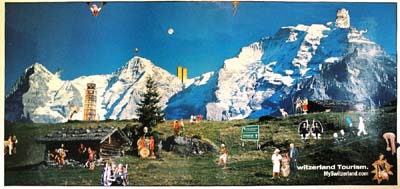France and the Netherlands have turned their backs on one version of a united Europe, but, defying that rejectionist spirit, with an important vote, Swiss voters have expressed their desire to cozy up closer to their neighbors in the European Union.
In the proudly neutral Swiss Federation, as Switzerland is technically known, decisions on major national policy issues, by tradition and by law, are put to nationwide referendum votes. This time, 54.6 percent of Swiss voters chose to join the so-called Schengen zone of 15 other countries whose citizens may travel between the zone's member states without the usual passport checks at their borders. (Basler Zeitung and Neue Zuercher Zeitung)
The vote means Swiss law-enforcement officials will also work more closely with their counterparts in the other Schengen-zone countries as far as cross-border security is concerned. The other countries in the passport-free zone include Austria, Belgium, Denmark, Finland, France, Germany, Greece, Iceland, Italy, Luxembourg, the Netherlands, Norway, Portugal, Spain and Sweden.
Swiss President Samuel Schmid called "the people's yes to Schengen" a "confirmation of a bilateral approach to Europe." In a joint statement, top E.U. officials said of the Swiss vote, "On the one hand, freedom of movement will obviously be facilitated; on the other hand, the cooperation on internal security can be strengthened." Sounding grateful for even a hint of support for what E.U. backers have long called "the European project," Germany's interior minister, Otto Schily, said that Swiss voters had given "an important, positive signal for Europe at a time when Euro-skepticism -- hopefully only temporarily -- is gaining the upper hand." (China Daily)
The vote was not without heated debate, however, some of which echoed recent French and Dutch argument over the tanked E.U. constitution. The yes vote on Schengen, political scientist Rene Schwok told the Swiss daily 24 Heures, was "[f]irst of all, a little yes." It signified, he said, "that there isn't a majority in this country that's [really] in favor of joining" the European Union.
He added that in offering Switzerland membership in the free-travel zone, the European Union had guaranteed the federal government in Bern that the country would give up none of its sovereignty. But that gesture, Schwok pointed out, paradoxically actually weakens the European Union in relation to little Switzerland, for the former normally diminishes the respective sovereign powers of countries that decide to join its multistate institutions. This time, though, in effect, in offering Schengen-zone membership to Switzerland, the European Union made it attractive for the country to take part in the free-travel zone, Schwok noted, but not necessarily to aspire -- someday -- to full E.U. membership. (24 Heures)
That would be just as well for the more conservative, mostly rural Swiss who voted against taking part in the Schengen agreement. As they saw it, echoing the fears and criticisms of French and Dutch voters who rejected the E.U. constitution, "the removal of border controls [will leave] Switzerland vulnerable to greater crime and economic migrants who would undercut high local wages and steal jobs." (Financial Times)



